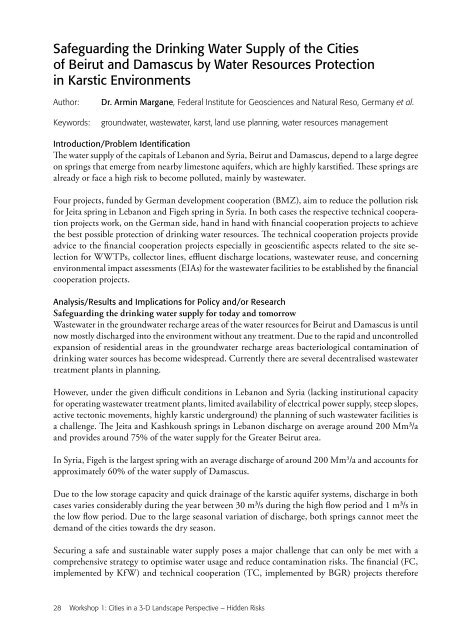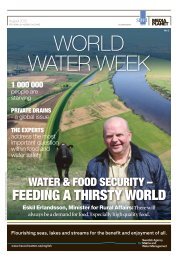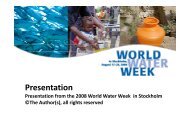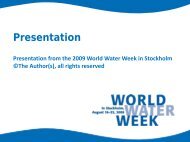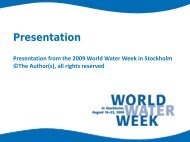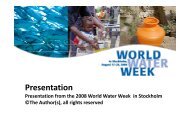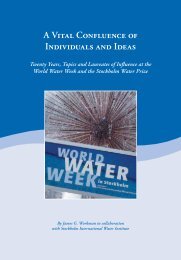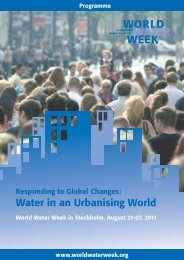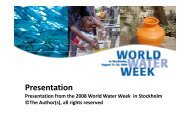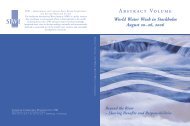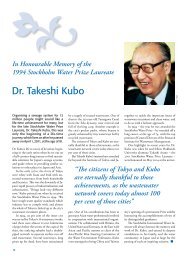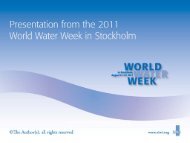- Page 2 and 3: Published 2011 byStockholm Internat
- Page 5 and 6: ContentsPresenters Photographs 6Wor
- Page 7 and 8: Mr. M. BarberWorkshop 2 OralMs. J.
- Page 9 and 10: Dr. N. HepworthWorkshop 8 OralMr. H
- Page 11 and 12: Mr. P. MwangiWorkshop 7 OralDr. H-G
- Page 13 and 14: Ms. S ShoukryWorkshop 5 PosterDr. A
- Page 15: Ms. L. ZelayaWorkshop 8 OralProf. L
- Page 18 and 19: Environmental Status Monitoring Sys
- Page 20 and 21: The Impact of Mining on the Water S
- Page 22 and 23: Improved Approaches for Determining
- Page 24 and 25: Groundwater Use Policy in Developin
- Page 26 and 27: Changing Shoreline Due to Coastal E
- Page 30 and 31: Waste Disposal in Mzuzu City, Malaw
- Page 32 and 33: Impact of Urbanisation on Groundwat
- Page 34 and 35: Need for ‘Integrated Water and La
- Page 36 and 37: Hidden Risks of Pako Dump Site in L
- Page 38 and 39: The Dynamics of Household Environme
- Page 40 and 41: $ for units 1-25, while service cha
- Page 42 and 43: The Water Resource Evaluation and P
- Page 44 and 45: very high degree and clogged due to
- Page 46 and 47: Prepaid Water Meter (PWM), a Matter
- Page 48 and 49: around their water assets and manag
- Page 50 and 51: Safe and Sufficient Drinking Water
- Page 52 and 53: Seawater Desalination and Water Pur
- Page 54 and 55: Water Born Recreation in Urban Area
- Page 56 and 57: Exploring the Effectiveness Communi
- Page 58 and 59: Water from Source to Vendors: A Gro
- Page 60 and 61: Socio-economic Consequences of the
- Page 62 and 63: and substances. Besides the well-kn
- Page 64 and 65: develop the small-scale purificatio
- Page 66 and 67: 66 Workshop 2: Need for a Paradigm
- Page 68 and 69: Financing Sustainable Urban Infrast
- Page 70 and 71: Quality Drinking Water from Economi
- Page 72 and 73: African Finance Facility to Mobilis
- Page 74 and 75: Water + Work: A Successful Programm
- Page 76 and 77: Adoption and Implications of Mobile
- Page 78 and 79:
Financing Water Projects and Cost R
- Page 81 and 82:
World Financial Crisis and Its Impa
- Page 83 and 84:
Making Water Affordable to All - A
- Page 85 and 86:
Implementation of Wellawaya Urban W
- Page 87 and 88:
The Public-Private Sector Partnersh
- Page 89 and 90:
Ecological Cost Benefit Analysis of
- Page 91 and 92:
Valuing Water Infrastructures Expan
- Page 93 and 94:
as a business was found promising i
- Page 95 and 96:
tive control tools and encourage mo
- Page 97 and 98:
provement of overall ecosystem heal
- Page 99 and 100:
suffering from high costs of the se
- Page 101 and 102:
Topography, Sewer NetworkThe topogr
- Page 103 and 104:
Scenario Generation Using GIS Based
- Page 105 and 106:
demand for water and energy drastic
- Page 107 and 108:
For the second and third aspects of
- Page 109 and 110:
Evaluating Management Solutions to
- Page 111 and 112:
An Economic-Engineering Analysis of
- Page 113 and 114:
Rapid Urbanisation and Associated S
- Page 115 and 116:
information to project areas of inu
- Page 117:
on the one hand, and, several menti
- Page 120 and 121:
Challenges for Supplying Pipe Borne
- Page 122 and 123:
Urbanisation and Climate Change Imp
- Page 124 and 125:
capacities for handling disasters.
- Page 126 and 127:
more comprehensive way of tackling
- Page 130 and 131:
of tourism. Many cities are growing
- Page 132 and 133:
Reviving the Tanks and Their Channe
- Page 134 and 135:
Using Climate Information to Prepar
- Page 136 and 137:
Regional Climate Model Projections
- Page 138:
Views from the Frontline [VFL]Autho
- Page 141 and 142:
use polyphonic paper and clean clot
- Page 143 and 144:
Assessing Cities Vulnerability to F
- Page 145 and 146:
Adaptation to climate is the proces
- Page 147 and 148:
T able 1 shows four categories of l
- Page 149 and 150:
Considering the rainfall historical
- Page 151 and 152:
Indications from the assessment of
- Page 153 and 154:
Climate Change Adaptation of Friham
- Page 155 and 156:
Workshop 5: Water for Sustainable U
- Page 157 and 158:
Water Suplly Sevice and the Wellfie
- Page 159 and 160:
Water Future in Iraq in According w
- Page 161 and 162:
Citizens Initiative to Enhance Wate
- Page 163 and 164:
Importance of Rainwater Harvesting
- Page 165 and 166:
Urban Infrastructure in Transition:
- Page 167 and 168:
of measures to make the ground wate
- Page 169 and 170:
metropolitan region of Rio de Janei
- Page 171 and 172:
water budget plan submitted by deve
- Page 173 and 174:
Part 1 provides the methodology of
- Page 175 and 176:
To Construct “Watertown” Interg
- Page 177 and 178:
The ultimate success of the 2005, 2
- Page 179 and 180:
viral particles during 30 min. Appl
- Page 181 and 182:
which are responsible for vulnerabl
- Page 183 and 184:
Completion of the Flood Protection
- Page 185 and 186:
Increasing Role of Large Reservoirs
- Page 187 and 188:
New Application Model for Sustainab
- Page 189 and 190:
Greywater Reuse in Vulnerable Peri-
- Page 191 and 192:
Supply System Expansion and Rehabil
- Page 193 and 194:
One must also note that, the sum of
- Page 195 and 196:
Collection of Water Sector in Mexic
- Page 197 and 198:
Conflict Hydroecological Situations
- Page 199 and 200:
Integrated Environmental Management
- Page 201 and 202:
water-bearing layers, then the more
- Page 203 and 204:
total study areas. Environmental im
- Page 205 and 206:
Leg five is consultancy activities.
- Page 207 and 208:
Wastewater Reuse for Sustaining Urb
- Page 209 and 210:
Wetlands: Natural Infrastructure fo
- Page 211 and 212:
Green River; An Integral Solution f
- Page 213 and 214:
What Is the True Cost of Green Cert
- Page 215 and 216:
and (4) increase the risk of dam fa
- Page 217 and 218:
prolonged and frequent. Therefore,
- Page 219 and 220:
the pipe large. This can be avoided
- Page 221 and 222:
Workshop 6: The Urban ShadowInstrum
- Page 223 and 224:
ning concepts and frequently these
- Page 225 and 226:
Celeste Cantú, Santa Ana Watershed
- Page 227 and 228:
y a loss of values. The case of Xoc
- Page 229 and 230:
were identified: the management of
- Page 231 and 232:
There is immense scope for shorteni
- Page 233 and 234:
ing role in the development of wate
- Page 235 and 236:
Regional cooperation on this subjec
- Page 237 and 238:
trade-offs between environmental co
- Page 239 and 240:
An Adaptive Co-management Model in
- Page 241 and 242:
Waste and Energy Streams in Food Pr
- Page 243 and 244:
City and the Countryside: The Dynam
- Page 245 and 246:
Global Cities, Local Water Sources:
- Page 247 and 248:
Is Peri-Urban to Urban Groundwater
- Page 249 and 250:
The Impact of Large Health Resorts
- Page 251 and 252:
Implications of Urban Demand for Fo
- Page 253 and 254:
New Wetlands Formation in Reservoir
- Page 255 and 256:
Urban Expansion and Its Encroachmen
- Page 257 and 258:
Urban Exploitation of Footprint Reg
- Page 259 and 260:
Lessons for Regulators, Utilities a
- Page 261 and 262:
Water Provision under Border Condit
- Page 263 and 264:
Project Reach - Reaching the Urban
- Page 265 and 266:
Services and Supply Chains: The Rol
- Page 267 and 268:
Emerging Trends in Public-Private P
- Page 269 and 270:
Addressing Inequities in Port Au Pr
- Page 271 and 272:
Reinterpretation of Traditional Sym
- Page 273 and 274:
Safe Water Campaign in Schools and
- Page 275 and 276:
Modelling Sanitation Chaos? Sanitat
- Page 277 and 278:
Service Delivery and Development: L
- Page 279 and 280:
Providing Pro Poor Water Services i
- Page 281 and 282:
Water as a Business: An Experiment
- Page 283 and 284:
M-Water - A Transformative Model fo
- Page 285 and 286:
Urban Development, Social Inequalit
- Page 287 and 288:
Decentralised Service Delivery and
- Page 289 and 290:
What Kind of Water for What Kind of
- Page 291 and 292:
Risks and Vulnerabilities of Water
- Page 293 and 294:
An unfriendly legal procedure, abse
- Page 295 and 296:
more systematic, coherent and strat
- Page 297 and 298:
In most cities, an increased level
- Page 299 and 300:
ment of positive attitudes for a ne
- Page 301 and 302:
• Adopt appropriate financial pol
- Page 303 and 304:
communities, public forums and hear
- Page 305 and 306:
ties of Delhi, a number of alternat
- Page 307 and 308:
Availability of Water in the Povert
- Page 309 and 310:
Urban development paradigm has been
- Page 311 and 312:
Bringing Tenants into the Equation
- Page 313 and 314:
Agriculture approximately 0.5 billi
- Page 315 and 316:
• Good tool for implementation of
- Page 317 and 318:
Workshop 8: Regulatory and Social C
- Page 319 and 320:
activities of different stakeholder
- Page 321 and 322:
termination of the scheme and this
- Page 323 and 324:
From water quality point of view, e
- Page 325 and 326:
Our analytical framework asks for t
- Page 327 and 328:
For different locations in the worl
- Page 329 and 330:
ture of water resources management
- Page 331 and 332:
munities, in particular through ele
- Page 333 and 334:
The VPS is built on the build-own-o
- Page 335 and 336:
The Human Right to Sanitation: Brid
- Page 337 and 338:
Also, Aysa organised media campaign
- Page 339 and 340:
Both examples are analysed in the l
- Page 341 and 342:
The deliberate policy making model
- Page 343 and 344:
First, a central aspect is that aff
- Page 345 and 346:
Another main problem behind the inc
- Page 347 and 348:
in a way that reflects environmenta
- Page 349 and 350:
The broad contours of reforms in ur
- Page 351 and 352:
One size certainly does not fit all
- Page 353 and 354:
structure, as response to the socia
- Page 355:
For this analysis, CCAD considered


